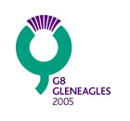| Bush Proposes New African Anti-Poverty Initiatives for G8, Focus on education, justice for women, combating malaria Official G-8 Summit Website |  |
Washington -- On the eve of the Group of Eight (G8) Summit, where Africa is slated to be a major focus, President Bush has reaffirmed the commitment of the United States to partner with African countries to respond to their economic, political and health challenges.
He also announced three new initiatives to be presented at the summit in Gleneagles, Scotland, that are designed to help eradicate poverty in Africa through broader education, enhanced justice for women and a more robust fight against the continent’s leading killer, malaria.
In a June 30 speech in Washington attended by many African ambassadors and senior officials in his administration, Bush reviewed the breadth and scope of the U.S. involvement in Africa.
From humanitarian assistance to aid and trade, from international peacekeeping in Darfur to security and conflict resolution, from HIV/AIDS programs to environmental protection, Bush outlined U.S. plans to work with African nations and institutions to improve life across the continent.
Specifically, Bush proposed to double the current funding for the United States Agency for International Development (USAID) African Education Initiative, which would provide $400 million to train half a million teachers and grant scholarships for 300,000 young people, mostly girls, within the next four years. He stressed the importance of education for women, which enables them to become more productive and responsible citizens in politics and the economy and on all social levels.
An important aspect of empowerment and the fight against AIDS "is the legal protection of women and girls against sexual violence and abuse,” Bush said. To promote protection and justice for African women, the president proposed a grant of $55 million to four African nations that have shown exemplary legal treatment of women and said he would encourage the other members of the G8 to provide similar support.
The president also said he would be urging the countries of the G8, as well as private organizations, to begin an aggressive campaign to halve the mortality rate for malaria, which, he noted, took approximately 1 million lives in Africa last year alone, a majority of which were among children 5 years old or younger.
To cut the malaria death rates, Bush proposed an initiative that would provide indoor spraying; long-lasting, insecticide-treated nets; and effective new combination drugs to treat malaria in three countries in 2006: Tanzania, Uganda and Angola. The program would add four countries in 2007, and an additional five countries in 2008, with projected spending reaching $1.2 billion over the next five years.
The president will try to gain the support of G8 members for this proposal in order to extend treatment and prevention methods to an additional 15 countries, with the hope of saving the lives of hundreds of thousands of Africans.
These proposals will be brought to the G8 summit as a follow-up to an earlier finance ministers’ decision to forgive $40 billion of debt owed by 18 of the world’s poorest countries, 14 of which are African. (See related article.)
“We're determined not only to relieve debt, but to erase it, so nations in need can face the future with a clean slate,” Bush said.
“The whole world will benefit from prosperity and stability on the African continent. And the peoples of Africa deserve the peace and freedom and opportunity that are the natural rights of all mankind,” the president said.
He said the United States has “tripled overseas development aid to Africa" during his presidency, and he proposes to double the current amount of aid to Africa by 2010.
But sending new financial resources to Africa is not enough, Bush said. “Our greatest challenge is to get beyond empty symbolism and discredited policies, and match our good intentions with good results,” he said, and he outlined specific areas he wishes to focus on.
First, he emphasized the importance of economic aid. “Economic aid that expects little will achieve little. Economic aid that expects much can help to change the world,” he stressed.
He lauded the Millennium Challenge Corporation, established a year and a half ago, as a new approach to assistance that rewards governments of developing countries “that fight corruption, embrace democratic government, encourage free markets, and invest in the health and education of their people” with a long-term aid package.
The president also underscored the importance of economic aid going hand-in-hand with free trade. “While aid and debt relief can create better conditions for development, it is trade that provides the engine for development,” he said.
The African Growth and Opportunity Act (AGOA), which has reduced trade barriers between the United States and Africa, has already led to an increase in trade between the two.
Referring to the achievements of his Emergency Plan for Aids Relief, which he called the “largest health initiative in history,” the president noted expansion of AIDS testing facilities, training of doctors and nurses, upgrading of hospitals, care for orphans, AIDS prevention programs, and anti-retroviral treatment that has already reached more than 230,000 adults and children in Africa.
President Bush concluded by stating, “When we work with Africans to bring food to starving regions, and malaria treatments to remote villages, and miracle drugs that restore the dying to strength, this is part of our calling in the world. And as we answer that call, it makes us proud to be Americans.”
more at g-8 or g8 and Africa or Gleneagles and president bush







No comments:
Post a Comment